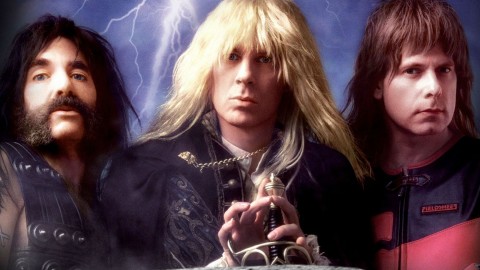NME Music News, Reviews, Videos, Galleries, Tickets and Blogs | NME.COM

Am I alone in thinking we’ve been sold a dud on this whole ‘internet’ thing?
It promised us a limitless world of communication then hooked us up almost exclusively with judgemental mobs and Moscow’s deepest Brexit bot super-basements. It told us we’d have a universe of information at our fingertips, then bombarded us with lies and ads and convinced generations that Rick Astley was some kind of omnipotent superbeing. It claimed it would find us all love at the tap of a button – then stalked, ghosted and suggestive-emoji’d us into bitter balls of hate, and finally left us standing at the Heathrow arrivals gate with a drooping bunch of flowers wondering why Ukrainian supermodel Ivana Ripkeksov didn’t make her flight, since you sent the First Class fare to the same account as all that money for her brother’s dialysis machine.
And it promised musicians an online utopia, with the artist as all-powerful webmaster. Here you could release your music however and whenever you liked, instantly bypassing all the evil old record labels with their artist-fleecing contracts and delivering your music direct to an enthusiastic global audience of cash-flinging merch junkies with Ticketmaster on speed-dial. Billions of them, right now, just sitting there desperately scouring Bandcamp for your latest lockdown acoustic duet with the bloke from Starsailor.
Gotcha, suckers. Turns out we swapped one set of brutal galleon slave-drivers for a new bunch with acid-soaked whips and no water, telling you to drink your own sweat. Last week, in an interview with Music Ally, Spotify’s billionaire CEO Daniel Ek informed artists that in the streaming age “you can’t record music once every three to four years and think that’s going to be enough. The artists today that are making it realise that it’s about creating a continuous engagement with their fans. It is about putting the work in, about the storytelling around the album, and about keeping a continuous dialogue with your fans.”
Meet the new boss, even more mercenary and exploitative than the old boss. What Ek is saying here is that he has helped instigate a new system whereby the vast majority of acts are paid so little for the consumption of their music – thanks to platform and label carve-ups – that they can no longer release a record and then tour it properly for a couple of years (which, ironically, has become their main source of income thanks to streaming) before making another one. To claw their way to any sort of longevity, they’ve got to keep relentlessly pumping out music like a sonic sweatshop in return, if they’re lucky, for the price of the occasional Twix.
Gone are the days when a musician could afford to take all the time they need to carve and craft the next ‘Loveless’ or ‘OK Computer’, he’s telling us. Just keep that Spotify content spewing along like so much own brand bog-roll.
It’s the sort of talk of bare-faced commerce over art – of music as a near-worthless commodity – that even the most cynical label execs used to save for hushed wing-chair discussions in the corners of members club cigar rooms. And, if he’s right, it has some pretty fundamental consequences for the present and future of music.
For a start, success is now openly for sale. The next self-releasing Oasis can forget about streaming as a fast-track golden ticket out of poverty; by Ek’s reckoning you’re going to need enough budget behind you to PR a single release a month for a few years to get anywhere close to a sustainable career. So that culture-wide blanket of well-funded, box-ticking, identikit major label pop/R’n’B tat will only get many togs thicker and all that great rising DIY talent the internet promised us will continue to be suffocated underneath.
Ek claims that 13,000 new artists have entered the platform’s “top tier” in the past year, yet I must’ve missed the seismic, groundbreaking sonic revolution this would inevitably have caused while I was scratching around trying to find anything that didn’t feature Lil Wayne or Drake.
His vision marks the end of the album as we know and love it, too – the rounded statements of art that mark out our lives and identities. There will still be 45-minute collections of songs called ‘albums’, sure, but since artists will have to keep pumping out tracks all the time, they’ll probably just be cobbled together from songs you already know, released gradually over the previous months to keep the fans engaged, and followed immediately by another indistinguishable cycle.
Perhaps we’ll come to refer to the process as ‘Eking out’. Unless you’re already a Taylor Swift or an Adele, you won’t be able to afford the advantage of a hyped up ‘event’ album release like ‘Folklore’; you’re just a worker drone feeding into a system in which only the pre-ordained queen bees get fat.

In effect Ek is suggesting that, in this new age of music distribution and consumption, we revert to the formative conveyor belt model we saw in the ‘50s and early ‘60s, before artists wrestled control of their own art and started making meaningful, creative works on their own terms. The days when besuited, interchangeable blue-eyed crooners – treated as pure disposable commodity, only as good as the gleam on their teeth – put out two or three albums of evergreen covers every year, with a couple of written-to-order originals thrown in, to keep themselves perpetually in the charts.
Yet there’s a vast cultural difference between then and now. In 1960 youth culture itself was young, excitable and invested in individual acts: psychologically you appreciate something far more if you’ve actively gone out and bought it. 60 years on we’ve developed herd immunity to most new music – when something’s as free and abundant as water from a tap, you tend to take it for granted or simply ignore it. There’s always been a real thrill to the idea of bands as comets, shooting by every few years scattering stardust; catch it while you can.
It’s made music fandom feel like a wave machine; the anticipation of a band teasing their first new material in years gives the stan a brief euphoric lift, fading just in time for the next band to sweep in again. If those acts never went away but sat there dripping out tracks every six weeks without fail, the effect would feel more like waterboarding or, worse still, advertising. It’s why you’ll spend all night arguing about a surprise Kanye album in the pub, but never The Chase.
And in this eternal, bewildering dribble of new music, how many acts could you reasonably stay perpetually engaged with for years on end before you’d lose interest in all but a couple of them? The result, as before, is the established acts winning through and the smaller, often more talented artists dwindling, like Rishi Sunak handing all that taxpayer’s money to MacDonalds under the guise of Britain eating its way out of coronavirus.
The easiest solution, of course, would be for streaming platforms like Spotify to work with the labels to reconfigure their increasing profits to ensure that all artists get the fair share they deserve from their streams and can continue making and releasing music as and when they want.
And if you’re reading this, Ivana, please get in touch – the phone number you sent me has 13 digits too many.
The post Spotify’s Daniel Ek wants artists to pump out ‘content’? That’s no way to make the next ‘OK Computer’ appeared first on NME Music News, Reviews, Videos, Galleries, Tickets and Blogs | NME.COM.




